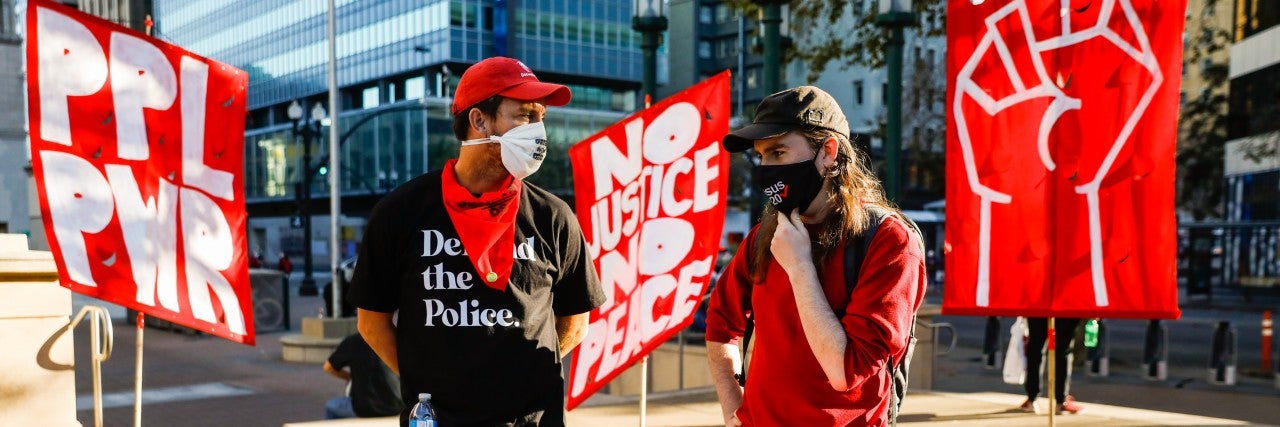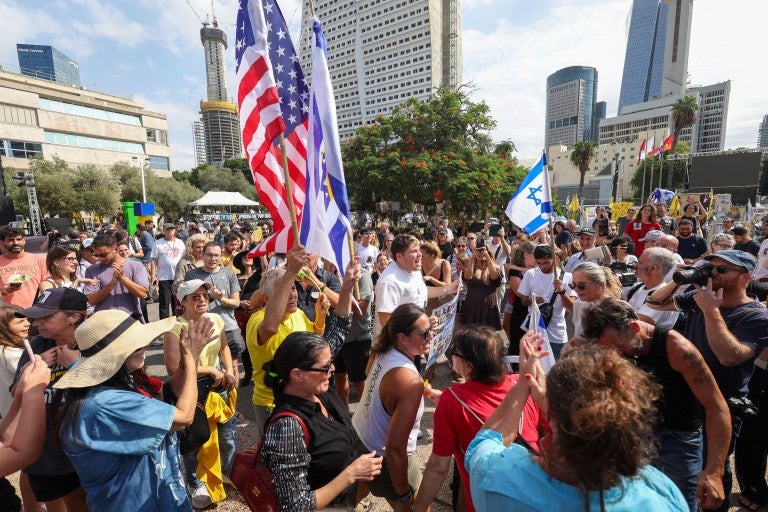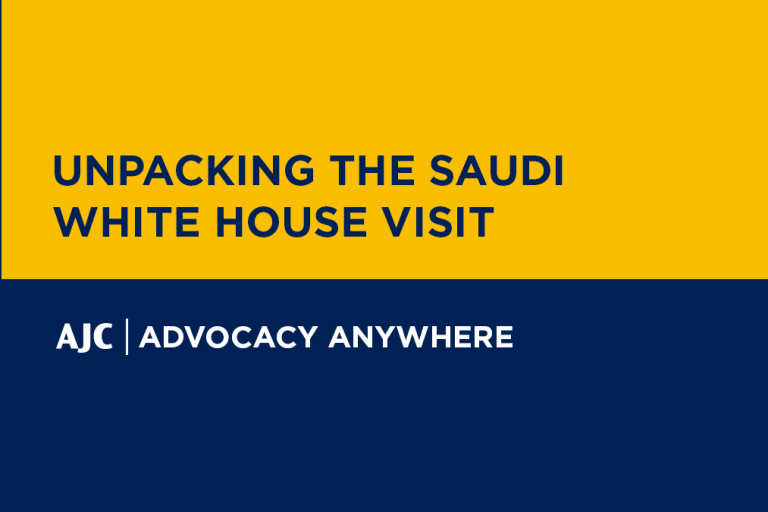November 7, 2025
The Democratic Socialists of America (DSA) has evolved from its founding in the early 1980s as a Zionist organization under Michael Harrington to a far-left group openly hostile to Israel. Today, the DSA influences U.S. progressive politics through endorsements, campus activism, and the support of prominent elected officials, including New York City mayor-elect Zohran Mamdani. Its positions on Israel and Jewish issues have raised concern among Jewish and pro-Israel organizations, including American Jewish Committee (AJC), as the far-left group advances anti-Zionist campaigns, Boycott, Divestment, and Sanctions (BDS) initiatives, and rhetoric that ignores or even tacitly endorses antisemitism and Palestinian terror groups like Hamas.
Where DSA Came From (and Who Leads It Today)?
The DSA traces its roots to the 1970s and early 1980s, formed in 1982 when the Democratic Socialist Organizing Committee, led by Michael Harrington, merged with the New American Movement. Harrington, a Zionist and friend of Shimon Peres, a former Prime Minister and President of Israel, wrote in 1975: “The basic fact … is that Zionism … is the national‑liberation movement of a Jewish people asserting their right to self‑determination.”
Since Michael Harrington’s leadership in the 1980s, the DSA’s position on Israel has undergone a dramatic shift. Over the ensuing decades, it moved away from Harrington’s democratic socialist Zionism and support for a two-state solution, ultimately embracing openly anti-Zionist policies in the 2010s as the Occupy movement and Bernie Sanders’s 2016 presidential campaign drew a new generation of progressives into the organization. Today, prominent elected officials aligned with the DSA include Representatives Alexandria Ocasio-Cortez (D-NY) and Rashida Tlaib (D-MI), as well as New York State Assemblymember and New York City Mayor-elect Zohran Mamdani. Rep. Greg Casar (D-TX), a member of the House elected in 2022, lost support from his local DSA chapter due to his pro-Israel stance.
Although Independent Vermont Sen. Bernie Sanders is not a member of the DSA, he has long identified as a democratic socialist, and the organization’s growth has been aided by the popularity of the Vermont senator, whose presidential campaigns in 2016 and 2020 inspired a new generation of progressives.
DSA national leadership sets overall strategy, but local chapters heavily influence policy, endorsements, and activism, often pushing the organization toward more extreme positions on Israel and Jewish issues.
For example, the DSA’s New York City chapter, with which Zohran Mamdani is affiliated, organized a pro-Palestinian rally in Times Square the day after the October 7 Hamas massacre. At the rally, protesters chanted slogans including “Resistance is justified,” “Globalize the Intifada,” and “Smash the settler Zionist state.”
What Policies Does DSA Support?
The DSA describes itself as the largest socialist organization in the United States, claiming more than 80,000 dues-paying members and chapters in every state, united around representing the working class. While the DSA’s platform calls for “the abolition of capitalism” and a “democratically run economy,” most of its endorsed political candidates pursue more incremental goals—seeking to reshape U.S. policy along the lines of Scandinavian social democracies rather than abolish the capitalist system outright.
How DSA Differs From the Democratic Party?
The DSA is a political organization, not a political party, and is not officially part of the Democratic Party. However, it often supports and fields candidates in Democratic Party primary elections while maintaining its independence. According to the DSA, many socialists “joined with others on the Left to build a broad‑based, anti‑corporate coalition” within the Democratic Party, while also building its own organization and challenging the mainstream leadership of the Democratic Party.
On Israel, the DSA sharply diverges from mainstream Democratic Party positions, openly advancing anti-Zionist policies and endorsing candidates who question or reject Israel’s right to exist as a Jewish state.
What is the DSA’s Stance on Israel?
The DSA portrays Israel as a “settler-colonial, apartheid” state and asserts full solidarity with the Palestinian cause, calling for “the end of Israel’s colonization and occupation of all Arab lands” and the “right of all refugees to return”—a demand that would effectively eliminate Israel’s identity as a Jewish state because it includes all of the descendents of the original Palestinian referees in 1948. Through its platform, Palestine Solidarity Toolkit, and public statements, the organization falsely labels Israel’s defensive war in Gaza a “genocide,” endorses the BDS movement, calls for an end to U.S. military aid to Israel, and promotes efforts to economically and academically isolate Israel. It frames Israel not only as a human-rights violator but also as an extension of broader U.S. military and geopolitical power, portraying its existence and defense as part of an “imperial system” that advances American strategic interests in the region.
How has the DSA reacted to October 7 and the War in Gaza?
The DSA’s hardline stance on Israel began alienating key progressive allies and threatening its political influence following Hamas’ October 7, 2023, massacre.
- Pro-Palestinian Rally in NYC: Days after the attack, DSA promoted a rally where some attendees celebrated the killings, prompting condemnation from DSA-backed Rep. Alexandria Ocasio-Cortez and then-Rep. Jamaal Bowman (D-NY).
- Membership Departures: Rep. Bowman, already criticized internally for visiting Israel, let his membership lapse; Rep. Shri Thanedar (D-MI) quit, citing DSA’s refusal to condemn terrorism.
- Other Criticism: LA Councilmember Nithya Raman denounced the national statement for ignoring Hamas’ violence, and she was subsequently censured by the group after she sought an endorsement from a liberal Zionist group, Democrats for Israel.
- Political Consequences: By mid-2024, DSA withdrew its endorsement of Ocasio-Cortez after her participation in an antisemitism panel, and also condemned her July 2025 vote on funding for Israel’s Iron Dome defense system, but she remains affiliated with the DSA; NYC Comptroller Brad Lander resigned, saying the DSA’s reaction “crossed a moral line.”
Despite blowback in the weeks after October 7, the DSA members and chapters became prominently involved in anti-Israel activism, especially on college campuses through its youth wing, the Young Democratic Socialists of America (YDSA). YDSA’s more than 100 U.S. chapters organize students at universities and high schools, often partnering with groups like Students for Justice in Palestine to co-host protests, encampments, and training events, while building international solidarity through their U.S.-based networks.
Despite near constant calls for a ceasefire, the DSA rejected the Gaza ceasefire reached in October 2025 as a “conditional” deal that “does not wash the hands of the ruling class,” falsely accusing Israel of “genocide” and “apartheid” while expressing support for “Palestinian resistance” and “the right of return”—without mentioning Hamas or the October 7 attacks.
What has Zohran Mamdani Said About Israel?
Zohran Mamdani’s views on Israel closely mirror the DSA platform, shaped by his early pro-Palestinian activism at Bowdoin College as the head of the school’s Students for Justice in Palestine (SJP) group, as well as his work on DSA-backed candidate Khader El-Yateem’s 2017 city council campaign. During the 2025 Democratic mayoral primary, Mamdani faced criticism from rivals and Jewish leaders, including AJC CEO Ted Deutch, over his support for BDS and refusal to condemn slogans like “Globalize the Intifada.” AJC, a 501c3 organization that does not endorse or oppose candidates for elected office, has remained deeply troubled by Mamdani’s continued use of problematic rhetoric as it relates to Israel and Jews, including claims accusing Israel of “genocide” and his refusal to support Israel’s right to exist as a Jewish state.


